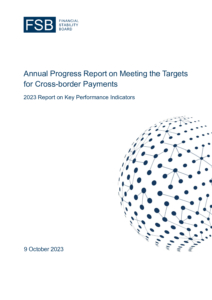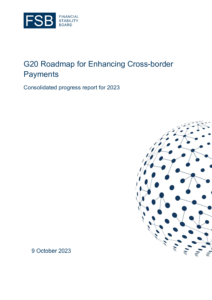Press enquiries:
+41 61 280 8477
[email protected]
Ref: 30/2023
-
The FSB reports today on progress made on priority actions to meet the G20 cross-border payments Roadmap targets.
-
We are also publishing today an initial dataset of Key Performance Indicators (KPIs), which are designed to track over time the extent to which the targets are being met, where progress is being made and where challenges remain.
-
While there has been good progress, further action is required to achieve the targets and realise the broad benefits that will come from enhanced cross-border payments. This will require collaboration and engagement between and beyond the G20, involving both the public and private sectors.
The Financial Stability Board (FSB) today published its inaugural annual report on KPIs for meeting the targets for cross-border payments and a consolidated report on progress under the Roadmap. These reports are complementary and together provide a quantitative and qualitative overview about the challenges facing cross-border payments, the progress being made on the G20’s priority actions, and public and private sector projects underway globally to enhance cross-border payments
The two reports have been delivered to the G20 Finance Ministers and Central Bank Governors for their meeting in Marrakech, Morocco, on 11-12 October.
In the KPI report, the FSB has identified data sources to calculate a set of representative KPIs as of end-March 2023. Over time, annual updates of the KPIs will provide estimates of progress toward meeting the cross-border payments targets across three market segments: wholesale, retail and remittances. Overall, at the global level, the KPIs indicate that progress will be needed to meet the targets across all three market segments. The data confirms that user experiences – including costs and speed of payments – differ substantially across regions. For example, payments involving some, typically lower income, regions tend to be among the furthest from the cost and speed targets across market segments. Furthermore, whereas in the retail segment, foreign exchange (FX) costs seem to be the largest component of total costs, the degree to which this is true differs across regions and use-cases; by contrast, in the remittances segment, other fees tend to be larger than FX costs. However, data gaps remain and the FSB will continue to work to enhance the data available, and where possible, fill the gaps.
The consolidated progress report brings together in one place the wide-ranging, interconnected work being taken forward by the FSB, the Bank for International Settlements’ Committee on Payments and Market Infrastructures (CPMI) and partner bodies on the priority actions under the Roadmap endorsed by the G20 in February this year. Examples include: developing the capabilities of central payment and settlement infrastructures, supporting the move to common data standards for payments messages, delivering the tools needed for harmonised application programming interfaces (APIs) in the payments industry, and providing a vehicle for the investigation of the legal, regulatory and supervisory frameworks that govern cross-border payments.
Achievement of the targets will require collaboration and engagement between and beyond the G20, involving both the public and private sector. The FSB and CPMI have each established a public-private sector taskforce to provide the basis for coordinated action on the infrastructure needs and regulatory considerations to help to achieve the targets. These taskforces will provide a means to coordinate action and change. The CPMI established a community of practice for central banks as payment system operators, with more than half of members being central banks from beyond the G20. The International Monetary Fund (IMF) and World Bank have also enhanced their technical assistance programme to support the cross border payments roadmap.
In sum, the Roadmap’s actions are focused on practical projects to reach the G20 targets, which are ambitious but achievable. If the relevant actors take the necessary actions, through the public and private sector working together the Roadmap goals can be achieved and we can realise the broad benefits that will come from enhanced cross-border payments.
Jon Cunliffe, Deputy Governor of the Bank of England, Chair of the CPMI and Co-Chair of the FSB Cross-border Payments Coordination Group (CPC) that coordinates the Roadmap said: “For the first time, we now have the data to measure how far we need to go to achieve the G20 targets for enhanced cross-border payments. There are encouraging signs of progress, but there is a considerable distance to go. Continued action and commitment by the public and private sectors is required. The progress report and key performance indicators published today will help target this action to achieve the improvements we need.”
Lesetja Kganyago, Governor of the South African Reserve Bank and the other Co-Chair of the CPC, said: “The KPIs published today will help to stimulate discussion among private and public sector stakeholders about the nature of the remaining challenges. The picture varies considerably by region and by type of payment – the data shows where we need to foster the greatest improvement, which will be the priority for future work. This will require partnership with countries beyond the G20.”
Notes to editors
The G20 has made enhancing cross-border payments a priority to achieve faster, cheaper, more transparent and more inclusive cross-border payments, while maintaining their safety and security. The FSB, in coordination with the CPMI and other relevant international organisations and standard-setting bodies, developed in 2020 a Roadmap to address these challenges. A key foundational element in the Roadmap is the publication of quantitative targets to be achieved by 2027 for better outcomes for those making and receiving payments.
In October 2022, G20 Finance Ministers and Central Bank Governors endorsed the next phase of work, which outlined a plan for prioritising work under the Roadmap to achieve the quantitative targets that have been set, and for enhancing engagement with the private sector and with jurisdictions beyond the G20. In February 2023, the FSB outlined specific actions that will be taken under the three priority themes to move the Roadmap forward and achieve the targets by 2027. The three priority themes cover: payment system interoperability and extension; legal, regulatory and supervisory frameworks; and cross-border exchange and message standards.
The FSB coordinates at the international level the work of national financial authorities and international standard-setting bodies and develops and promotes the implementation of effective regulatory, supervisory, and other financial sector policies in the interest of financial stability. It brings together national authorities responsible for financial stability in 24 countries and jurisdictions, international financial institutions, sector-specific international groupings of regulators and supervisors, and committees of central bank experts. The FSB also conducts outreach with approximately 70 other jurisdictions through its six Regional Consultative Groups.
The FSB is chaired by Klaas Knot, President of De Nederlandsche Bank. The FSB Secretariat is located in Basel, Switzerland and hosted by the Bank for International Settlements.

